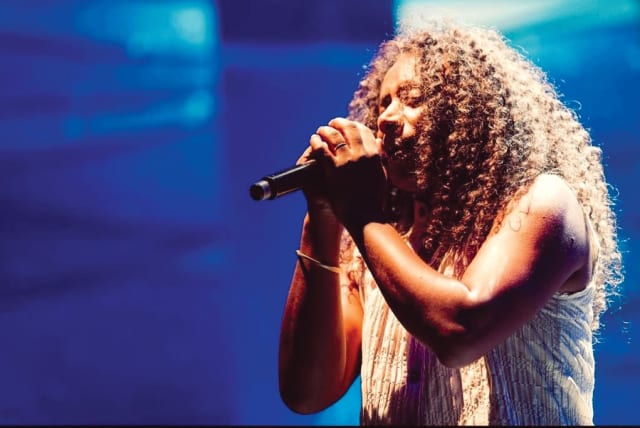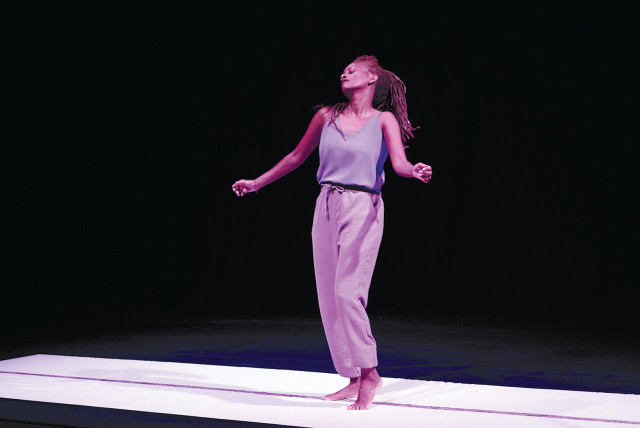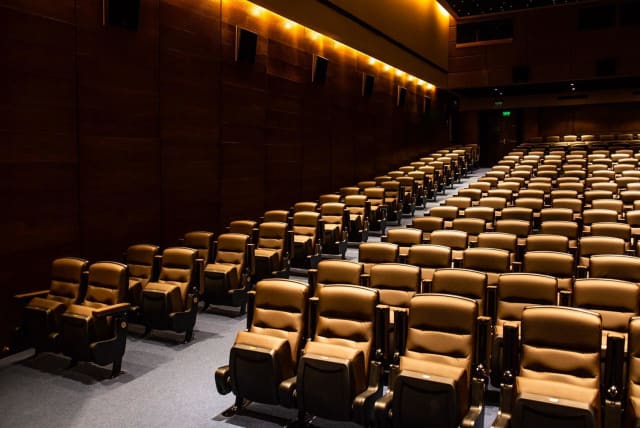Oshi Masala likes to mix things up.
She says it keeps her on her toes, and interested. Hence, her gig at this year’s Hullegeb Israeli-Ethiopian Arts Festival features a brand new trio that she calls Ahun (“now” in Amharic).
The festival, established by Confederation House and its long-serving CEO and artistic director Effie Benaya, showcases the best the Ethiopian community has to offer across a wide range of disciplines. It provides an important platform for artists who may otherwise struggle to get some media attention and perform for an audience at a prestigious venue.
Masala certainly makes the most of the festival, which this year runs from December 23 to 26. Her slot is on the last day at 6 p.m. “I have played at Hullegeb four or five times,” says the 30something vocalist, pianist, guitarist, and double bass player. “Performing at Hullegeb has opened doors for me.”
She notes that the event helps spread the word about what Israeli-Ethiopian artists have to offer the local entertainment sector. “More people have become exposed to the music and dance and other areas of the arts we engage in. Playing at Hullegeb also led, for example, to my appearing at the Poets Festival in Metula,” she says.
That may be a natural progression, considering that the annual poetry program also takes place under the auspices of Confederation House. But the impact factor does not just apply to ever-widening circles within the consumer hinterland. Musicians from outside the community of various stylistic and genre ilks also collaborate with Israeli-Ethiopian artists at Hullegeb, thereby bringing in new audiences who may not have heard of, say, Dege Feder and the Beta dance troupe but who are into the music of veteran Iraqi-rooted, internationally renowned violinist-oud player-vocalist Yair Dellal.
The latter is a pertinent case in point, as Dellal stars in this year’s curtain raiser (December 23, doors open 8:30 p.m., show starts 9 p.m.) alongside saxophonist-vocalist Abate Berihun, The latter has been one of the leading members of the Israeli jazz scene for 20 or so years, teaming up with numerous mainstream jazz and ethnically leaning improvisational artists and performing at major venues and events here and abroad.
The front two will be joined at the Yellow Submarine by an intriguing cross-cultural quartet of instrumentalist-vocalists who bring rich Ethiopian and Bedouin backgrounds to the fray.
Israeli mosaic
Besides placing Israeli-Ethiopian cultural wares in the spotlight, keeping creative options open and casting an accommodating net across broad artistic tracks has long been a hallmark of the festival. Masala believes that suits, in more senses than one.
“Israel is a mosaic of people from all sorts of origins,” she says. That, she feels, can have beneficial fallout for all concerned. As challenging as that can be, as each wave of olim faces the trials of gaining a foothold in the host society, once the initial minefield has been successfully negotiated, there are rewards to be had across the board.
“We are learning to be more accepting,” Masala continues. “We are becoming a nation that hears more and listens more. We are now learning that in the most difficult way there is. But we are opening up our ears to new things, and our hearts too. Pain brings with it new means of opening up and listening.
“My view is that, first of all, we have to see each other as human beings. Everything begins with that. And music is multifaceted,” she says. That resonates with the festival moniker, which means just that – multifaceted – in Amharic.
Listening to and watching Masala and her cohorts at Hullegeb do their entertaining artistic thing is definitely one way of channeling our energies, anxiety, and enduring capacity to find new meaning and joy in life. For her, it is also a matter of constantly breaking new ground, walking untrodden paths to artistic fulfillment, and maintaining a delicate balance between the familiar and the unknown.
Her partners in musical endeavor for the occasion later this month are Yisrael Bar-On and Daniel Azta, who, as luck would have it, share plenty of common ground. Bar-On, who plays guitar, keyboards, and sings, and drummer-vocalist Azta are old pals who collaborated as members of an Israeli song cover trio. As this is the threesome’s first professional outing together, having two-thirds of the group who enjoy such a sense of unity and close understanding must be quite a boon.
“Yes, that is important,” says Masala. “There is a good bond between us, and things are going well [with the rehearsals].”
The Israeli nugget covers element is a major component of the Hullegeb show, along with songs in Amharic, as well as many originals. In fact, Masala has done her fair share of reimagining time-honored staples of the Israeli songbook – naturally, in her own singular way – such as “Heyee Shketa” (“Be Quiet”), written by veteran poet-songwriter Rachel Shapira, which Masala enhanced with a couple of stanzas in Amharic.
“We are going to renew songs – songs that everybody loves,” she states. There is a heartwarming ulterior motive for that. “I think that will create a sense of being together,” Masala adds. “Songs by Riki Gal, Aviv Geffen, Arik Einstein, and all those songs that everybody in the auditorium will know the words.”
Then again, it won’t just be a matter of turning up, settling into our seats, and going with the sing-along flow. “They may know the words, but they won’t be familiar with the new emotion we introduce to the songs,” Masala chuckles.
Although many may know Masala primarily as a singer, she is a dab hand at the three instruments she plays, and often makes do without the verbal component. While the voice is the primordial means of sonic expression, including rhythmic and melodic sounds, a means we take with us everywhere we go, she feels there is much to be said for eschewing the textual side.
“Words can be absolute and inflexible. When you say the word ‘boker’ (morning), that’s exactly what it means, and the same goes for ‘layla’ (night). Everybody knows what that means. But there is something about instrumental music, about melodies, that allows you to enter the world of your choice. That is the wonderful thing about it. It is so accommodating. I see the instrumental side as a ladder, which allows you climb as high as you want.”
She learned an important lesson in that regard from one of our most respected songwriters, Yoni Rechter. “I once heard at a workshop where he said that sometimes the melody continues the text. You don’t always have to write something [textual]. Anyway, I am also playing some instrument,” she laughs.
That refers, in particular, to Masala’s third – and latest to date – album, Album Live.
“I put it together during COVID-19,” she says. During the pandemic period of great uncertainty and pervading tension – sadly, that sounds all too pertinent to where we are currently at as well – she says she actually fired a desire to break out of the tried and tested, the four walls of our confines, and take a leap of faith.
“You know, we often do things within frameworks and boxes. That goes there, and that belongs over there. We tend to pigeonhole things. But sometimes, when you go for the unknown or when the melody is just a melody, you should just allow it to be that and see where it takes you,” she says.
Integral culture
Masala’s own time line has been taking here, there, and everywhere.
As a child, she heard broken Hebrew along with Amharic at the home of her Ethiopian-born parents, who made aliyah in 1981. Like many first-generation Israelis, she did her damnedest to blend in and take on the airs and aspects of a homegrown Sabra. It took her a while, fittingly, when she began taking her artistic bent a little more seriously, to accept the fact that Ethiopian culture – music, language, the whole ethnic kit and caboodle – was integral to her very being and her core identity.
Before the age of 18, she sang exclusively in Hebrew. Then she had a positive, life-changing experience. “I flew to the US, and the security man asked me where I was from. When I said Israel, he said I couldn’t be because I was Black. When I told him my parents came from Ethiopia, he said, ‘What? On Operation Moses?’ When I said yes, he said ‘Wow!’ and I got VIP treatment from the security personnel, who were all Black,” she recounts.
That encouraging encounter set her on the road to where she is today, an Israeli singer-songwriter digging into her ethnic roots and constantly spreading her eager wings across ever-widening cultural and stylistic realms. “I began getting more into Amharic – I only understood it until then – and my musical journey really started from there.” That eventually spawned her self-titled debut album, which came out when she was 25.
She also received some sage advice from a veteran of the Israeli ethnic music scene who, like her, combined his Israeliness with seasoning from elsewhere. “I told [Uruguayan-born percussionist] Ronnie Evrin that I wanted to be a musician but didn’t have any idea how to do that,” Masala recalls. “He told me that I should look back into my past, my roots. I learned that you have to sing your own story, your own truth. That was an important lesson,” she asserts.
As a budding professional, she came across other influential figures, such as popular singer-songwriter Etti Ankri, who exploded onto the local pop-rock scene in the early 1990s. There is something in Masala’s vocals that connects the dots with the now more spiritually leaning senior performer.
Despite the almost three-decade age gap, the two had something of a meaningful confluence some years back. “I don’t follow her career closely but, like so many others, she was one of the people who wrote the musical soundtrack to my childhood. But I met her at one of her shows when I was 18,” she says.
In fact, they did more than just meet. Masala relates that Ankri “asked if anyone wants to sing her song ‘Ani Roah Lecha Be’enayim’ [‘I See It in Your Eyes’], and I got on the stage and sang it with her.” Not bad for a starry-eyed teenager.
“There was in magic, and we chatted and got to know each other a bit,” Masala recalls. “I was so impressed with her texts, the way she sings them, and the way she brings her truth. That is incredible.”
Masala has been mining her own seams ever since, delving ever deeper in order to capture, feed off, and convey something of her own truth through her work. Interestingly, after Ankri became religious, the raw power of her older rock numbers was fused through more spiritual prisms.
Masala says she gets that. “Working in music means you address the soul, all the time,” she observes. “You have to immerse yourself in your inner self, to find your essence.”
That has been her touchstone during the course of her close to decade and a half career thus far, and she ain’t gonna let up anytime soon. “And I’ve got a new song called ‘Mami’ coming out soon,” she enthuses. “It’s about my [four-year-old] son.” There’s nothing like a proud Jewish mom.
Masala hopes we get that at Confederation House on December 26 and, basically, a much-needed breather from the ongoing conflict. “We’ll take a moment to relax a bit and get some down time from all this situation,” she says. And with a nod to Ahun, the name she chose for her band, she adds, “Now is the time for that.”
It certainly is. ❖
For tickets and more information: *6226; (02) 539-9360 ext. 5; tickets.bimot.co.il; www.confederationhouse.org








































































































